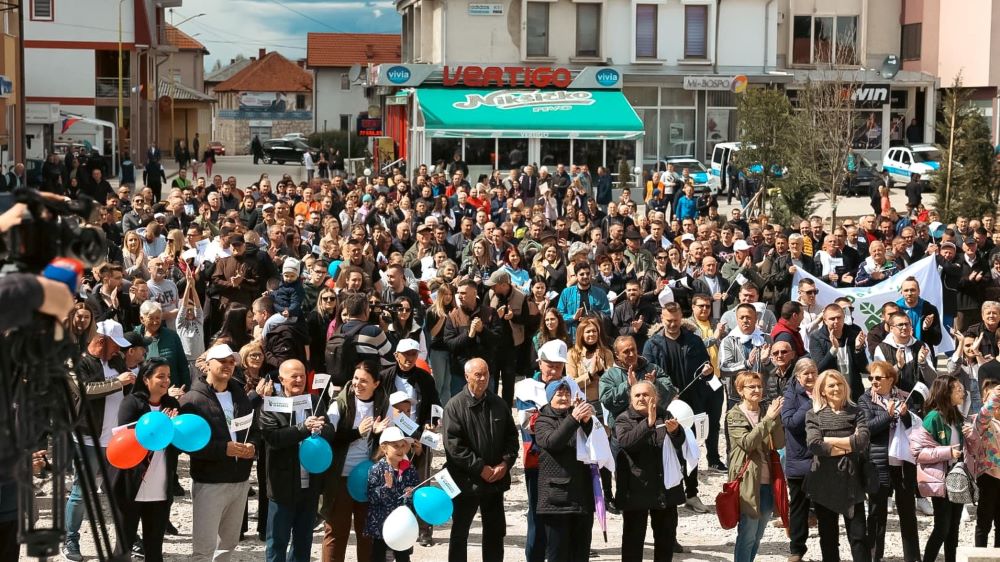While the political leaders in Bosnia and Herzegovina are teaching us that it’s impossible to establish cooperation and solve common problems on a country level, new generations are determinately showing us the opposite through example.

Adi Selman
Almost thirty years after the war in Bosnia and Herzegovina, it was unthinkable that an association or group of citizens from the Federation of Bosnia and Herzegovina (a majority-Bosniak entity of the country, according to the regime’s national divisions) would organize a protest or a peaceful assembly in Republika Srpska (a majority-Serb entity of the country, according to the regime’s national divisions). All this in cooperation with the local population, and in order to fight a common problem or injustice that affects people equally, regardless of the entity border.
This belief was shattered on April 15, when at the request of the Karton Revolucija (Cardboard Revolution) movement (Tuzla, FBiH) and in cooperation with Eco activists (Vlasenica, RS), for the first time after the war, a a large peaceful gathering was held against the construction of a factory for chemical-thermal plastic processing in Vlasenica. Simply put, this would be a waste incinerator that would turn this little town and the entire region into a European garbage dump. The citizens of Vlasenica, but also Milić, Han Pijesak, Kladnje and the entire Tuzla Canton stood up in defense of the right to life – all together, regardless of religious or any other affiliation, aware of the consequences that this facility can cause. Over 800 people took to the street for a peaceful gathering.
While the political leaders in Bosnia and Herzegovina are teaching us that it’s impossible to establish cooperation and solve common problems on a country level, new generations are determinately showing us the opposite through example, slowly opening a new chapter of our future. The peaceful gathering in Vlasenica, apart from likely stopping construction of the plastic incinerator, sent a strong message to the people that national and entity divisions highlighted by politics do not represent a real problem and new times are coming, in which people will be increasingly aware of this. This creates the assumption that Bosnia and Herzegovina will soon become a progressive European country that is strongly moving towards the European Union, ensuring its citizens the right to a quality life.
Organizing a peaceful gathering for activists from Tuzla and Vlasenica meant receiving a large number of threats and attacks, with the motive of spreading national tensions by the local chief and his henchmen from the SNSD party, who also happen to own the factory that is being built. The rally was declared a high-risk event, and the activists had a hard time getting permission to hold it, just because some of the organizers have different names or come from a city that doesn’t really suit the regime’s representatives.
Nevertheless, Vlasnica, a small town under Mount Javor and its “ordinary citizens”, together with the people of Tuzla, have proven that there are still many who think with their own heads and who are ready to stand up for the protection of their human rights, but also to rise decisively above the system that uses tactics of provoking national tensions in an attempt to cover up decades of crime and destruction of a beautiful country in the mountainous Balkans.
We believe in the future, but we are also aware that we have to fight for it. As long as we live in a country with the highest percentage of corruption, the highest rate of brain drain, and in a system where if you are a Roma, Jew or Bosnian-Herzegovinian you do not have the right to be a presidential candidate, we must fight even harder.
Adi Selman, activist, Karton Revolucija (Carton Revolution)



Generalno, izvozane floskule i infantila perspektiva od NGO uhljeba i Fahrinih SBB aktivista. Meni je stvarno zao sto te Cerberus (SDA, HDZ, SNSD) sprijecio u tome da naucis kako treba citati, pisati i pricati. Jel ovo stil koji se uci na Kallosu?
Lijep pozdrav